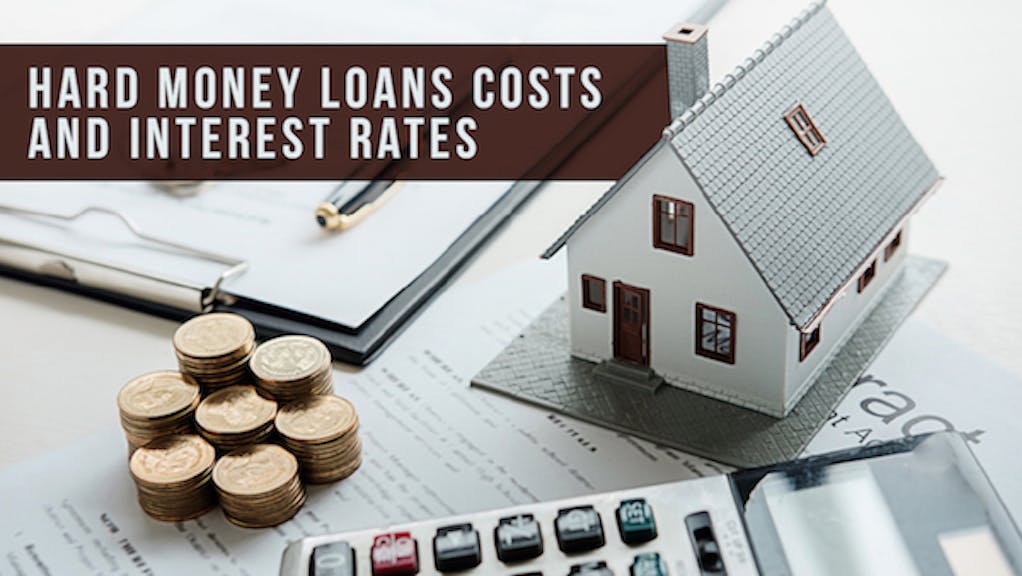A Guide to Hard Money Loans Costs and Interest Rates

Hard money loans can be a real estate investor’s best friend. As cliché as this may sound, the statement does hold water. These loans provide a stable flow of funds for real estate investors looking to supplement their investment deals.
Whether an investor needs to quickly close on an undervalued property or fix it up for a prospective buyer, a hard money loan is a valuable tool to keep in one’s toolbelt. But as with a conventional loan, hard money loans do have costs. Understanding them is the key to making the most of a real estate investor’s greatest capital source.
Most seasoned real estate investors are familiar with the gist of hard money loans. However, many still don’t seem to understand the actual mechanics of how they work or what they truly cost. That’s why we’ve taken the time to break down the basics of hard money loan costs and interest rates.
Hard Money Loan Monthly Payments
Hard money loans, also known as bridge loans, are a short term loan based on a hard asset. Most reputable hard money lenders will look at both the asset and the creditworthiness of a borrower before agreeing to lend money on a deal. With that said, the requirements and paperwork involved are often quite a bit less stringent than a conventional loan. Hard money loans therefore can typically close in days instead of many weeks, and have the ability to fund more money into a transaction which requires less money out of pocket from the borrower. While this is what makes hard money loans so attractive, it is also their primary drawback. Why? Well, giving out loans with easier underwriting requirements and funding more money on a deal means greater risk to the lender.
As a result, they’ll often charge high-interest rates to mitigate the risks. Although these rates vary from one hard money loan lender to another, the average hard money loan interest rate for 2020 is 11-13%, according to Bankrate. Still, depending on the lender, it might be anywhere between 7% and 15% annually.
How to Get Better Interest Rates on Hard Money Loans
Even though interest rates or monthly payments for hard money loans are typically higher than conventional rates, one may be able to lower the interest rate by doing the following:
- Increase Your Down Payment: A down payment helps a lender mitigate the risks associated with giving out loans to individuals when the lender funds the transaction at a lower Loan to Value Ratio (LTV). Increasing the down payment proves the borrower is committed to the project in question and that they will be less likely to default.
- Improve Your Personal Credit: A healthy credit score is the measure of financial literacy. Months before applying, improve your credit so that the lender can be confident there will not be a default.
- Complete and pay off multiple loans with a hard money lender: The better track record one has when dealing with the lender, the more open minded they will be to adjusting the interest rate or origination charged since theoretically there should be less risk.
Hard Money Closing Costs
Other than the monthly interest rates, additional hard money costs include:
- The Origination Fee/Points: Points cover the costs of borrowing the money and processing the loan. Points for a hard money loan are usually higher than those of a conventional one. Based on the specifics of the loan and the lender, the origination may be anywhere between 1% and 5% of the total loan. But why are they higher? Well, hard money lenders are in the business of creating and giving loans quickly and with a higher advance rate. Just as with any other business, their business also comes with operational costs and risks. For instance, to successfully run a hard money lending facility, the lender must pay for technology, office space, and a hard working staff. Plus they need to align with strategic partners like title companies, appraisers, insurance agents, etc that can help in facilitating the loans to close quickly and efficiently. Since their loans require repayment within a shorter time frame, they usually do not have the luxury of economies of scale, hence the higher origination fee.
- Underwriting fees: To secure a hard money loan, the lender must legally secure their interest in the property that is placed as collateral. To achieve this, both parties agree to these terms in a legally binding agreement. A qualified attorney from a reputable law firm helps draw this agreement and any other legal documents involved in the transaction. This brings about yet another closing cost known as the loan doc or the underwriting fee. Depending on the complexity of the loan, the doc fee can be as low as $500 or as high as $5,000.
How Much Money Do You Have to Put Down on a Hard Money Loan?
A majority of lenders often require borrowers to put a down payment of 10-20% on a loan for a residential property, and 30-40% in the case of a commercial property. The exact amount put down varies depending on the lender, the loan to ratio value, and other loan terms. However, not all lenders require a down payment. It depends on the specific program and how the lender mitigates risk within their fees.
That being said, pay careful attention to lenders who claim to offer hard money loans with zero down payments to all borrowers as there may be other costs associated with the loan. For instance, they may offer you a zero-down payment option, but charge ridiculously high-interest rates and origination fees, impose absurd pre-penalty terms, or unrealistic payment schedules.
Other Hard Money Loan Costs
Other expenses which aren’t part of the closing costs but may be included in your loan include but are not limited to:
- Extension Fees: Lenders expect you to pay back the loan within a specific timeline, usually between six months and two years, depending on the amount in question and other loan terms. However, life happens, and you may find yourself unable to pay within the required timeline. If this is the case, some lenders may extend your deadline but charge an extension fee. Make sure you ask a potential lender what happens if you need a little more time to repay your loan.
- The Pre-Penalty Fee: While some lenders penalize you for paying late, others will charge you for paying early. They expect you to stay with the loan for the minimum set time so they can gain profits from your monthly interest rate. For instance, if you’re required to pay your loan back in six months, they may expect you to hold on to the loan for at least four months. Repaying it before this set time denies them profits from your monthly interest. To ensure you don’t pay earlier, such lenders will impose a pre-penalty fee. Make sure you read through the fine print of the contract to see if this fee is part of the terms, or just ask the lender upfront.
Hard Money Loan Requirements
Although hard money loans can be easily accessible, this doesn’t mean lenders give their money to anyone who comes walking through the door. In light of that, here are some of the requirements:
Borrower Qualifications
While some lenders are asset based, most also care about how the borrower looks on paper as well. The borrower’s liquid reserves and creditworthiness are two main indicators of how likely a borrower would be to pay back the loan in a timely manner. Now the specific criteria of how lenders measure the amount of money needed in the bank or a specific credit score varies by the individual lender so it’s important to understand that early on in the process.
A Down Payment or Skin in the Game
While not all lenders require a down payment, many of them do. The loan they offer you will cover a majority of the purchase costs, but the down payment proves the commitment to the project. It also helps the lender mitigate the risks. After all, they are putting in a lot of money into the project, so it would only be fair if the investor shares in the risk by putting in some of their capital too. Even if a lender will fund the majority or all of purchase price and renovation, then they will typically want some skin in the game, which can come in the form of origination points, admin fees, doc fees, and other similarly described terms.
A Feasible Deal
Lenders in this category are business professionals and looking to maximize profits with each loan they give out. The lender and the borrower are on the same page as the lender wants the borrower to succeed so that the borrower makes money and successfully pays off the loan. The lender will first want to make sure the borrower is qualified by whatever criteria they set. Next they assess the deal to determine its feasibility before they approve the loan request. In other words, the chances of getting approved are higher once the lender is confident that the property and deal make sense.
In evaluating taking a loan to fix and flip a property or create a rental, make sure to evaluate its value in comparison to repair costs to determine the profit margin. Ensure the profit margin is high enough to not only pay the loan back but also make some good returns, whether it be from pure profit by selling to an end buyer or cash flow from renting to a tenant.
Should You Use Hard Money Loans for Real Estate?
Hard money loans are a tool that provides investors the opportunity to get in the real estate investing game. Not everybody can afford to buy a property and fix it up if they need to shell out 100k in cash on the spot, but many people do have 15k-20k in savings or checking and that would allow them to purchase their first flip or buy and hold property. In exchange for leveraging a lender’s money to buy a flip or start a rental portfolio, the convenience comes with caveats such as higher interest rates and origination fees. It is wise to utilize a hard money loan if you are confident that the work involved can be done fairly quickly, so there is enough time to sell the property and pay back the loan within the amount of the loan term.
Also it’s important for the investor to do their homework when it comes to repairs and carrying costs involved so that they feel confident they can cover any overages and withstand being in the loan while also making a healthy profit.
Discover Hard Money Loans Today
Remember, the hard money loan realm is saturated with the full gamut of lenders. These lenders all have slightly different requirements, terms and products. It’s important to find one that will help you to be successful and work with you during the life of a deal. Only take the leap if you are confident you are working with a well-established and reputable lender who will walk with you every step of the way.
If you are confident a property has the potential to generate a healthy property margin, but you are short on funds, do not let the opportunity pass you. Apply for a hard money loan today and get started right away.

